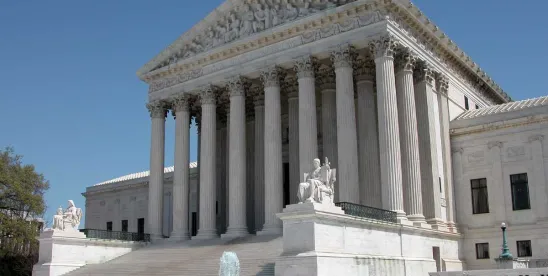On May 16, 2024, the United States Supreme Court unanimously held that, when enforcing an arbitration clause subject to the Federal Arbitration Act (FAA), if any party requests a stay, the district court lacks discretion to dismiss the underlying lawsuit. The high court’s ruling reverses the decision of the Ninth Circuit upholding dismissal, and resolves a long-simmering circuit split. Notwithstanding the FAA’s language appearing to mandate a stay, in which several circuits held that district courts have discretion to dismiss cases (without prejudice) pending arbitration.
Plaintiffs in Smith v. Spizzirri, 601 U.S. ___, 144 S. Ct. 680 (2024), were current and former delivery drivers for an on-demand delivery service who sued their employer in a putative class action in Arizona state court. After removing the case to federal court, the defendant moved to compel arbitration and dismiss the lawsuit. Plaintiffs conceded their claims were arbitrable, but requested the court stay the underlying case during the pendency of the arbitration, rather than dismiss it. The district court nevertheless issued an order compelling arbitration and dismissing the action without prejudice. The Ninth Circuit affirmed.
Justice Sotomayor, writing for the unanimous Court, noted that section 3 of the FAA, entitled “Stay of proceedings where issue therein referable to arbitration,” provides that courts “shall on application of one of the parties stay the trial of the action until [the] arbitration” has concluded. 9 U.S.C. § 3 (emphasis added). Evaluating the text of the FAA, the Court held that the use of “shall” in section 3 leaves district courts no discretion to dismiss actions when a party requests a stay, overriding any inherent authority the court possesses to control proceedings before it. Id., slip op. at 3-4. The Court reasoned that this outcome comports with the supervisory role of district courts contemplated by the FAA, allowing the district court to retain jurisdiction for the purpose of assisting in various tasks expressly contemplated by the FAA, including assisting in appointing an arbitrator, enforcing subpoenas, and facilitating recovery on an arbitration award. Id., slip op. at 6.
The Court also noted that, pursuant to section 16 of the FAA, when a district court enters a stay rather than a dismissal, the order staying the lawsuit is not immediately appealable. The Court observed that Congress’s purpose in enacting the FAA was to move the parties’ arbitrable dispute to arbitration as quickly as possible. With this purpose in mind, the Court reasoned that that, by allowing district courts to dismiss lawsuits in favor of arbitration, rather than stay them if requested by a party, district courts are providing the party contesting arbitration an immediate right to appeal – something Congress intended to foreclose through the FAA. Id., slip op. at 5-6.
An immediate right of appeal after dismissal causes delay to the arbitral process, increasing the costs of resolving disputes meant to be resolved quickly and efficiently in arbitration. The Smith decision will likely streamline the lifespan of cases ordered to arbitration, and allow defense counsel to more efficiently resolve arbitrable disputes without having to first litigate an interlocutory appeal.




 />i
/>i
